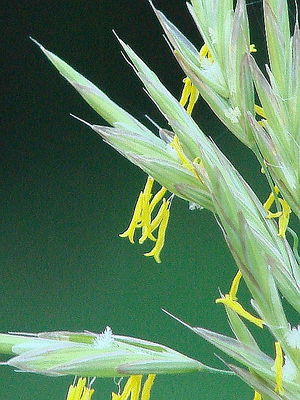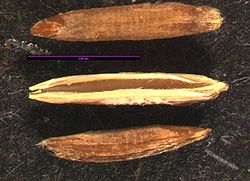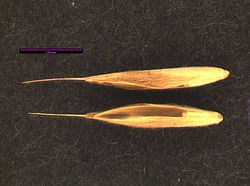Bromus sitchensis var. carinatus
- Scientific Name: Bromus sitchensis var. carinatus
- Family: Poaceae
- Common Names: California brome
- Synonyms/Misapplications: Bromus carinatus, Ceratochloa carinata
- Codon: BROSIT
Contents
Taxonomy
| Scientific classification | |
|---|---|
| Kingdom: | Plantae |
| Subkingdom: | Viridiplantae |
| Phylum: | Tracheophyta |
| Subphylum: | Spermatophytina |
| Class: | Magnoliopsida |
| Order: | Poales |
| Family: | Poaceae |
| Genus: | Bromus L. |
| Species: | Bromus carinatus Hook. & Arn. |
| Subspecies: | "Bromus carinatus var. carinatus Hook. & Arn. |
| Synonyms | |
| |
Description
Perennial grass with erect culms to 180 cm tall.[2] Sheaths closed, often pubescent, auricles greatly reduced or absent.[3] Inflorescences narrow panicles with 6 to 9-flowered, laterally-compressed spikelets.[2] Panicle branches with 1-5 spikelets.[4] Lemmas keeled, awned,[4] 7-11 veined, laterally compressed, typically glabrous;[2] lower glumes 3-7 veined, glabrous.[4]
Bloom Period
May-August[3]
Distribution
Across western North America.[3]
Habitat
Prairies, grasslands, shrublands, open forest.[4]
Propagation
Native Plant Network Propagation Protocol
Seed
Seed sample from: 2008
Average measurement: 14.6 x 1.5 x 1.5
Measurement range: L: 13.5 – 16 W: 1.1 – 1.8 D: 1.2 - 2
Features
Shape: Inner seed is about ½ the size of its husk, and brown.
Color:Seed husk tan, tending to be whiter toward hilium, and browner towards awn.
Surface:Hilium is somewhat glossy, while rest of husk is very hairy. Awn is brown and straight. Surface of seed longitudinally striate and glossy.
Latitudinal cross section: elliptical 
Longitudinal cross section: elliptical ![]()
Basic Explanations and Assumptions:
The dimensions for the seeds are length x width x depth. The location of the hilum is used as the base of the seed, and the length is measured from hilum to the opposite apex. Where a style is present, the length is measured from the hilum to the bottom of the style. Width is measured at a right angle to the length at the widest part. Depth is measured at a right angle to the intersection of height and width lines.
Measurements included are the mean average for each measurement of ten separate seeds.
All measurements in millimeters unless otherwise noted.
Photo Gallery
References
- ↑ Integrated Taxonomic Information System. Retrieved from https://www.itis.gov/servlet/SingleRpt/SingleRpt?search_topic=TSN&search_value=40520
- ↑ 2.0 2.1 2.2 Flora of North America. Retrieved from http://dev.floranorthamerica.org/Bromus_sitchensis
- ↑ 3.0 3.1 3.2 WTU Herbarium, Burke Museum, & University of Washington. Retrieved from https://biology.burke.washington.edu/herbarium/imagecollection/taxon.php?Taxon=Bromus%20sitchensis%20var.%20carinatus
- ↑ 4.0 4.1 4.2 4.3 Hitchcock, C. L., Cronquist, A., Giblin, D., & Legler, B. et al. (2018). Flora of the Pacific Northwest: an illustrated manual. Seattle: University of Washington Press. p. 781.






